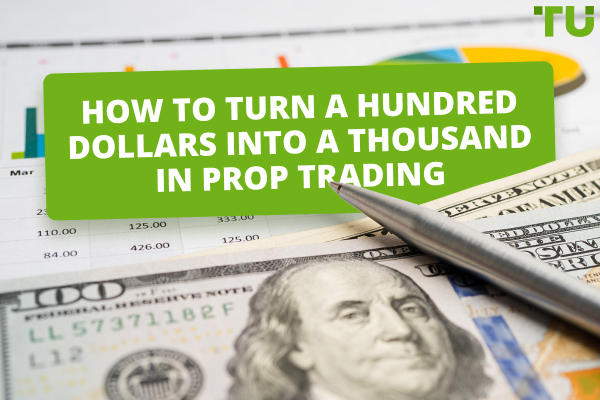Can you prop trade stocks?

Best prop company to trade stocks is TopStep
Top prop companies to trade stocks are:
Topstep - best for stock index futures trading
Fidelcrest - 1000+ tradable assets
SurgeTrader - best variety of tradable assets
Lux Trading Firm - stocks, bonds and CFDs
Prop trading, which stands for proprietary trading, refers to the practice of individuals or firms using their own money to trade stocks in the financial markets. In other words, prop traders don't trade with clients' funds but with their own capital. This type of trading allows individuals or firms to potentially profit from fluctuations in stock prices. In this article, the experts at TU will dive into the intricacies of prop trading and list down the best firms to prop trade stocks.
-
What is the minimum funding amount among prop trading firms?
The minimum funding amount varies between firms, but is generally around $25,000 - $50,000 for starter accounts. Some firms offer micro accounts beginning at lower levels.
-
Do prop firms charge fees for gaining funded trader status?
Most prop firms charge evaluation or testing fees that are refunded if funding is received. Fees typically range from a few hundred dollars to over $5,000 depending on the account size.
-
How long does it take to complete a prop firm's evaluation period?
Evaluation periods can last anywhere from a few weeks to 3 months, depending on the firm and account level.
-
Do prop firms charge ongoing monthly fees?
Some prop firms charge monthly service or platform fees ranging between $100-500 after receiving funded status. Others have no recurring fees beyond normal trading commissions.
What is proprietary trading?
For individuals interested in trading but without large capital reserves, proprietary trading presents an opportunity to gain experience and profits through funded trader programs. Prop trading firms allow traders to demonstrate their skills on a virtual account, after which top performers may receive real funding to begin trading with the firm's capital.
Funded prop traders leverage the funds provided by these firms to actively manage portfolios and profit from movements in the markets. Their goal is to generate returns that outperform targets set by the firm within given risk parameters. Traders employ strategies from technical and fundamental analysis in an attempt to pick winning trades.
While offered funding removes the need for traders to use personal capital upfront, there are still very strict rules involved. Weekly or monthly profit targets and maximum drawdown limits must be met to remain in good standing. Failure to do so could result in loss of funded status and receivables. Traders must practice diligent risk management to stay within assigned parameters and avoid wipes that eliminate any chance of long-term success on the platform. Meeting evaluation benchmarks is key to leveling up to larger accounts with higher profit potential over time.
For qualified individuals, the appeal lies in treating trading as a career without large minimums. Top performers can gain larger accounts with improved earnings potential over time. However, consistent, disciplined trading is a must given performance is continuously evaluated. Funded prop programs offer both risk and reward for developing traders.
Best prop firms
Experts suggest the following to be the best prop firms to trade stocks in 2023:
1 Topstep
Topstep has the brand strength and reputation that traders rely on as an industry leader and one of the Inc. 5000 fastest-growing companies in the United States. To engage in their funded account program, every trader begins with the Trading Combine. You can open a real-time virtual futures account with $50,000, $100,000, or $150,000 in purchasing power.
After the Trading Combine, you will receive a funded trading account if you demonstrate consistent profitability and risk management. Topstep sends funds to your account and allows you to trade in real-time with their capital without taking any personal risks.
After only eight trading days, traders can earn a funded account. The amount funded is equal to the plan chosen for the Trading Combine. Topstep is also extremely efficient in processing payouts daily, completing payouts requested before 10 a.m. CT the same day.
2 Fidelcrest
Fidelcrest offers 13 accounts to suit different types of traders, providing access to more than 1,000 financial instruments. Known for its robust training programs and exceptional support services, the prop firm offers profit splits of up to 90%.
There are two main accounts available at Fidelcrest, Micro Trader and Pro Trader, both of which offer Normal and Aggressive settings. Each risk type is funded at three different levels.
Depending on the risk type, the Micro account has funding between $25,000 and $50,000. A difference between the two lies in the profit targets, the minimum number of trading days, and the maximum loss limits. Micro Trader, for example, has a maximum overall loss limit of 10% and a profit target of 5%. There is a maximum loss of 20% with Aggressive risk, and a maximum profit target of 15%.
Currently, ProTrader accounts are funded between $150,000 and $1 million, of which $1 million is only available for Normal Risk accounts. Both accounts can be leveraged up to 1:100.
Each account type is evaluated in two steps, depending on the minimum number of trading days, maximum daily loss limit, and maximum overall loss limit. The KYC program at Fidelcrest requires that you submit documents in addition to meeting the trading parameters.
The fees for different types of accounts and risk levels vary. It costs between $104 and $474 to open a Micro Normal risk account. The prices for Micro Aggressive accounts range from $157 to $579, while those for ProTrader accounts range from $685 to $2,848
3 SurgeTrader
SurgeTrader offers 75% profit splits to funded traders who meet their trading criteria. It's the perfect prop firm to diversify your investment portfolio with a variety of tradable assets.
SurgeTrader has only one phase of evaluation, unlike many other prop firm trading entities. Traders of all skill levels can choose from six packages. With its Starter Package, you get $25,000 in instant funding and a 10% profit target. There’s a maximum trailing drawdown of 5%. The Starter Package is ideal for beginners who want to avoid aggressive accounts.
With a $1 million funding size and 75% profit split, the Master Package is the highest-tier account. A 10% target is set, along with a four-percent daily loss limit and a five-percent maximum trailing drawdown. If you have a lot of confidence in your abilities, this package may be for you.
Additionally, this prop firm offers a wide variety of tradable securities, including crypto and gold, as well as popular stock indices. It’s possible to leverage up to 1:10.
A top proprietary trading firm, SurgeTrader requires all of its clients to undergo evaluations. You need to pass only one phase of the SurgeTrader Audition process. It’s not necessary to earn over 10% of your account balance in order to pass the audition.
Audition fees range from $200 to $6,500 per account. There’s no limit to how many times you can take the audition. You can use credit/debit cards and PayPal to make payments and withdrawals.
4 Lux Trading Firm
Lux Trading is the perfect choice for beginners who want to spend their time hitting their evaluation goals as much as possible. You can trade up to $150,000 with no recurring monthly fees and no profit limits.
On top of forex, this company offers trading in stocks, bonds, and CFDs. When you open a demo account and try to meet profit targets, you can choose between three capital levels.
You can move to higher capital levels with this prop firm's Professional accounts after meeting a 10% profit target in 49 trading days. Your max drawdown limit is 4%, which is reset every month if you withdraw profits. In all stages, profit splits remain at 65%.
The size of your account doubles when you meet those parameters until it reaches $1 million. As a result of this scale-up mechanism, Lux Trading stands out from the competition. The leverage is 1:10 for Forex pairs and metals, 1:5 for indices, bonds, and commodities, and 1:1 for equity. Lux Trading allows weekend and overnight holdings, unlike other firms.
In addition to offering superb proprietary trading accounts for beginners, Lux Trading allows you to take as long as you like to reach your evaluation profit target of 6% and avoid a drawdown of more than 4%. You can move on to step two when you earn back your initial fee within 29 trading days and begin using real capital. The parameters remain the same, but 65% of the profits are yours to keep.
Lux Trading accounts range from £299 ($375) to £499 ($626). Wire transfers, Bitcoin withdrawals, and Wise withdrawals are all available as withdrawal methods.
How to identify a successful prop firm?
For prop firms to operate successfully, these areas must be their strengths:
Availability of funds: Proprietary trading requires firms to have a sufficient and stable source of funds. Unlike traditional investment firms that manage clients' or investors' money, prop firms utilize their own capital generated from their business activities. Having a robust cash flow provides a greater opportunity to earn higher returns and withstand potential losses
Effective use of trading algorithms: Prop firms heavily rely on cutting-edge and often expensive trading software. Given the substantial capital involved in their trades, it is crucial for these firms to leverage algorithmic or machine trading. By utilizing advanced algorithms, they can minimize the impact of human emotions and biases in decision-making, leading to more objective and systematic trading strategies
Timely position management: Since prop firms operate with significant amounts of capital, their positions, both short-term and long-term, can be numerous and sizable. A single erroneous trade has the potential to significantly erode the firm's capital. Therefore, prop firms need to employ effective position sizing techniques, closely monitor market conditions, and make timely adjustments to their positions to mitigate potential losses
Risk management: Proprietary trading inherently involves risk, and prop firms must have robust risk management systems in place. This includes setting appropriate risk limits, diversifying portfolios, and implementing stop-loss mechanisms to limit potential losses. Additionally, firms should regularly assess and evaluate the performance of their trading strategies and make necessary adjustments to adapt to changing market conditions
Market knowledge and research: Prop firms need to deeply understand the financial markets and continuously stay updated on industry trends, economic indicators, and relevant news events. Conducting thorough fundamental and technical analysis is essential to identify potential trading opportunities, managing risks, and making informed investment decisions
Compliance and regulations: Prop firms must adhere to regulatory requirements and compliance standards set by relevant financial authorities. They need to maintain transparency in their trading activities, record-keeping, and reporting to ensure legal and ethical practices
Technological infrastructure: To compete effectively in today's fast-paced trading environment, prop firms need to invest in advanced technological infrastructure. This includes high-speed and reliable connectivity, robust data analysis tools, and secure trading platforms. By leveraging technology, firms can swiftly execute trades, analyze real-time market data, and capitalize on time-sensitive opportunities
How to choose the best prop trading firm to trade stocks?
When selecting the best prop trading firm to trade stocks, consider the following points:
Research and recommendations: Begin by conducting thorough research on different prop trading firms. Look for reviews, testimonials, and feedback from other traders to gather insights into their experiences. Recommendations from trusted sources, such as professional traders or industry experts, can also be valuable in identifying reputable firms
Alignment of goals and objectives: Choose a prop trading firm that aligns with your investing goals and objectives. Consider factors such as the firm's trading strategies, risk tolerance, and preferred markets or asset classes. Ensure that the firm's trading style and philosophy resonate with your own approach to trading
Reputation and track record: Assess the reputation and track record of each firm under consideration. Look for established firms with a solid history of successful trading and a good reputation in the industry. Verify if the firm has any regulatory violations or disciplinary actions against them. This information can provide valuable insights into the firm's credibility and integrity
Customer service and support: Evaluate the quality of customer service and support offered by the prop trading firm. Prompt and effective communication, accessibility to knowledgeable representatives, and support for technical issues are crucial. A responsive and supportive firm can assist you in navigating challenges and provide guidance when needed
Fees and cost structure: Consider the fee structure of the prop trading firm. Compare commission rates, transaction fees, and any other charges associated with trading activities. It is important to strike a balance between competitive fees and the value provided by the firm in terms of support, resources, and trading opportunities
Trading platform and technology: Assess the firm's trading platform and technology infrastructure. A robust and user-friendly trading platform is essential for executing trades efficiently and accessing real-time market data. Look for features such as advanced charting tools, order types, risk management capabilities, and connectivity to multiple markets or exchanges
Risk management policies: Evaluate the risk management policies and practices implemented by the firm. A reputable prop trading firm will have well-defined risk controls in place to protect both the firm and the traders. This may include risk assessment procedures, position limits, stop-loss mechanisms, and ongoing monitoring of trading activities
Training and education: Consider whether the prop trading firm provides training and educational resources for traders. Look for opportunities to enhance your trading skills through workshops, webinars, mentoring programs, or access to educational materials. A firm that invests in trader development demonstrates a commitment to their traders' success
Expert Opinion
When evaluating prop firms focused on stock trading, it's important to carefully consider each firm's investment approach and strategies. Not all prop trading experience will directly translate to becoming a successful retail stock trader.
It's also important to understand how stocks are treated differently than other instruments from a risk perspective. Stocks typically offer less leverage than forex or futures, but fluctuations can be larger in both directions. Look for prop firms that will evaluate you holistically based on your ability to adapt strategies to market behavior, rather than just relying on numeric performance targets.
Ask about minimum position holding times as well. Day trading stocks may not be suitable for prop accounts due to higher commissions and taxes eating away gains. Firms focused on positional trading may be a better environment for long-term stock pickers.
Also, I would place extra emphasis on choosing a prop firm that provides comprehensive educational resources on stock trading. Things like in-depth stock analysis lessons, portfolio management seminars, and mentoring on developing a repeatable stock selection methodology can be tremendously valuable for refining your skills.
Methodology for compiling our ratings of prop firms
Traders Union applies a rigorous methodology to evaluate prop companies using over 100 quantitative and qualitative criteria. Multiple parameters are given individual scores that feed into an overall rating.
Key aspects of the assessment include:
Trader Testimonials and Reviews. Collecting and analyzing feedback from existing and past traders to understand their experiences with the firm.
Trading instruments. Companies are evaluated on the range of assets offered, as well as the breadth and depth of available markets.
Challenges and Evaluation Process. Analyzing the firm's challenge system, account types, evaluation criteria, and the process for granting funding.
Profit Split. Reviewing the profit split structure and terms, scaling plans, and how the firm handles profit distributions.
Trading Conditions. Examining leverage, execution speeds, commissions, and other trading costs associated with the firm.
Platform and Technology. Assessing the firm's proprietary trading platform or third-party platforms it supports, including ease of use, functionality, and stability.
Education and Support. Quality and availability of training materials, webinars, and one-on-one coaching.
Glossary for novice traders
-
1
Broker
A broker is a legal entity or individual that performs as an intermediary when making trades in the financial markets. Private investors cannot trade without a broker, since only brokers can execute trades on the exchanges.
-
2
Trading
Trading involves the act of buying and selling financial assets like stocks, currencies, or commodities with the intention of profiting from market price fluctuations. Traders employ various strategies, analysis techniques, and risk management practices to make informed decisions and optimize their chances of success in the financial markets.
-
3
Prop trading
Proprietary trading (prop trading) is a financial trading strategy where a financial firm or institution uses its own capital to trade in various financial markets, such as stocks, bonds, commodities, or derivatives, with the aim of generating profits for the company itself. Prop traders typically do not trade on behalf of clients but instead trade with the firm's money, taking on the associated risks and rewards.
-
4
Leverage
Forex leverage is a tool enabling traders to control larger positions with a relatively small amount of capital, amplifying potential profits and losses based on the chosen leverage ratio.
-
5
Risk Management
Risk management is a risk management model that involves controlling potential losses while maximizing profits. The main risk management tools are stop loss, take profit, calculation of position volume taking into account leverage and pip value.
Team that worked on the article
Chinmay Soni is a financial analyst with more than 5 years of experience in working with stocks, Forex, derivatives, and other assets. As a founder of a boutique research firm and an active researcher, he covers various industries and fields, providing insights backed by statistical data. He is also an educator in the field of finance and technology.
As an author for Traders Union, he contributes his deep analytical insights on various topics, taking into account various aspects.
Dr. BJ Johnson is a PhD in English Language and an editor with over 15 years of experience. He earned his degree in English Language in the U.S and the UK. In 2020, Dr. Johnson joined the Traders Union team. Since then, he has created over 100 exclusive articles and edited over 300 articles of other authors.
Mirjan Hipolito is a journalist and news editor at Traders Union. She is an expert crypto writer with five years of experience in the financial markets. Her specialties are daily market news, price predictions, and Initial Coin Offerings (ICO).



















